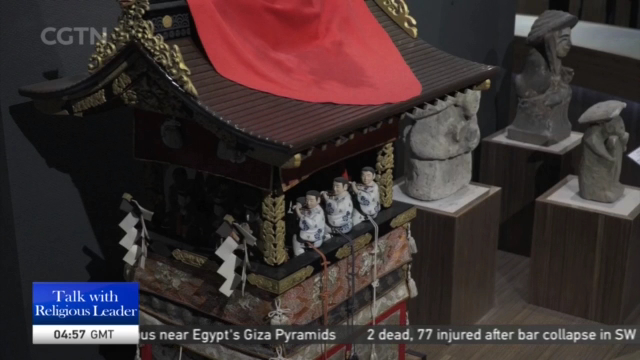
13:40, 20-May-2019
Shinto Religion & Nature: Native belief system influences everyday Japanese life
Updated
13:40, 23-May-2019
02:53

China is hosting the Dialogue of Asian Civilizations, celebrating the diversity of the continent's cultures. Today in our special series, we look at Japan. The country is filled with historical shrines that serve as places for Shinto worship. With deep roots in Japanese culture, the traditional religion is a rich, complex one. CGTN's Terrence Terashima tells us more.
There is no simple explanation for the Shinto religion. Some experts say it originates from Japan's Jomon period when basic belief forms and nature worship were said to have started.
TERRENCE TERASHIMA TOKYO "Shinto did not originate as a unified religion but rather as a collection of ancient beliefs and mythology closely related to agriculture and nature. The Japanese say there are eight million spirits or gods that exist in the forms of rocks, trees, places, and people."
Early Shinto chronicles date back to the eighth century. They describe myths, legends, and origins of the Japanese archipelago which is said to have been created by Amaterasu-Omikami, the goddess of the sun.
SHIGERU TORII PRIEST, KANDA-JINJYA "There are no doctrines or scriptures in Shinto. It originated from nature worship. Since rice was the most important food crop for the Japanese people, it came from expressing gratitude to nature and people. It is a religion that evolved from animism. However, it only became a known religion after the war. Before that, it was a way for people to worship 'gods' in their ways of life."
Shinto beliefs are deeply embedded into the Japanese culture and the environment. Harvests are considered blessings from the gods. Evil spirits and their wrath come in the form of earthquakes and typhoons which Japan has endured for centuries.
TAKAAKI DAITO ASSOCIATE PROFESSOR, KOKUGAKUIN UNIVERSITY "Shinto became an integral part in the formation of Japanese culture. It is not a single ancient belief that was passed down generations. Rather, it evolved with Japanese culture, as Japanese culture evolved with foreign influences."
Buddhism is one religion that has influenced Japanese culture.
TAKAAKI DAITO ASSOCIATE PROFESSOR, KOKUGAKUIN UNIVERSITY "Buddhism and Shinto gradually took root in Japan. The diversity of how gods were worshipped in Shinto may have played an important role in why Buddhism was adapted into Shinto culture."
SHIGERU TORII PRIEST, KANDA-JINJYA "Many people come to shrines to make wishes. It is important to come back and thank the gods when your wishes come true. It is important to have gratitude for what is keeping you alive."
Many Shinto teachings are reflected in everyday Japanese culture and traditional practices, such as cleanliness and self-discipline to achieve harmony with nature. Terrence Terashima, CGTN, Tokyo.

SITEMAP
Copyright © 2018 CGTN. Beijing ICP prepared NO.16065310-3
Copyright © 2018 CGTN. Beijing ICP prepared NO.16065310-3